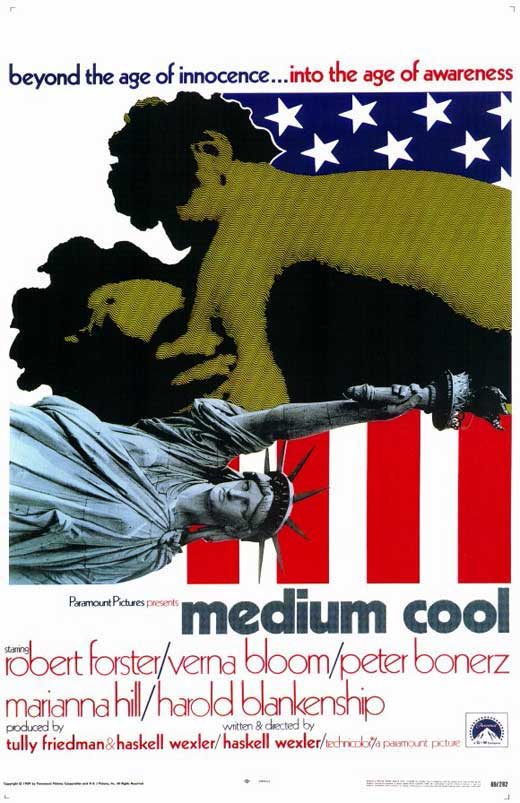
MEDIUM COOL
(director/writer: Haskell Wexler; cinematographer: Haskell Wexler; editor: Verna Fields; music: Mike Bloomfield; cast: Robert Forster (John Cassellis), Verna Bloom (Eileen), Peter Bonerz (Gus), Marianna Hill (Ruth), Harold Blankenship (Harold), Sid McCoy (Frank Baker), Christine Bergstrom (Dede), Peter Boyle (Gun Clinic Manager); Runtime: 110; MPAA Rating: R; producers: Tully Friedman/Haskell Wexler/Jerrold Wexler; Paramount Home Video; 1969)
“An interesting time capsule essay film that takes us back to the infamous 1968 Democratic National Convention in Chicago and its police riot.”
Reviewed by Dennis Schwartz
Once considered a pioneering effort in docudrama filmmaking, this indie landmark film is now reduced to being mostly an interesting time capsule essay film that takes us back to the infamous 1968 Democratic National Convention in Chicago and its police riot. Noted liberal cinematographer Haskell Wexler (“Latino”/”Underground”) makes his directorial debut and mixes cinema verite with fictional theater dramatics, as he follows Chicago television station lens-man John Cassellis (Robert Forster), a gritty on-the-scene cameraman who covered the RFK assassination, the scene at the Resurrection City in Washington, D. C., and the riot training at a National Guard camp. The aggressive John is partnered with the more tame soundman Gus (Peter Bonerz). John’s a Chicago native and an ex-CYO boxer who tells us in all sincerity, while watching Martin Luther King in a documentary, that “I love to shoot film.”
The film opens as John films the victim of a car crash before calling an ambulance. Later he meets with undue hostility from the black community when covering a news story of a black cab driver turning in to the authorities $10,000 he found in his taxi. In a parking lot John suspects 13-year-old West Virginia native Harold (Harold Blankenship) of trying to break into his car and chases him. Harold drops a carrying case containing a pet pigeon, and John returns the bird to the shanty town tenement where the boy resides with his pretty mother Eileen (Verna Bloom)–whose husband died in Vietnam and she came to the Windy City to find work.
Eileen and John hook-up, as tension mounts in the city with regular demonstrations against the war and the demonstrators from all over the country are met with a powerful police presence plus the Illinois National Guard patrolling the streets. John gets the boot from his job when he expresses outrage that behind his back the TV station supplied his footage to the FBI and local police. Now working free-lance, John covers the convention. When Harold spots mom and John embracing, the confused boy runs away from home. Eileen tries to track him down in nearby Grant Park, but gets caught in the rioting and tear gas bombs. Making contact with John, he takes her in his car to get away from the riot area. Upset over the day’s events, a distracted John crashes into a tree and Eileen is killed and he’s severely injured. A passing motorist stops to take a photograph of the accident and then drives on. Which tells us that “what goes around, comes around.” The contrived twisty ending is probably the deepest message conveyed in this well-crafted but uneven medium cool film, that was overlong but managed a number of memorable and meaningful shots of that tragic historical event.
REVIEWED ON 8/22/2008 GRADE: B